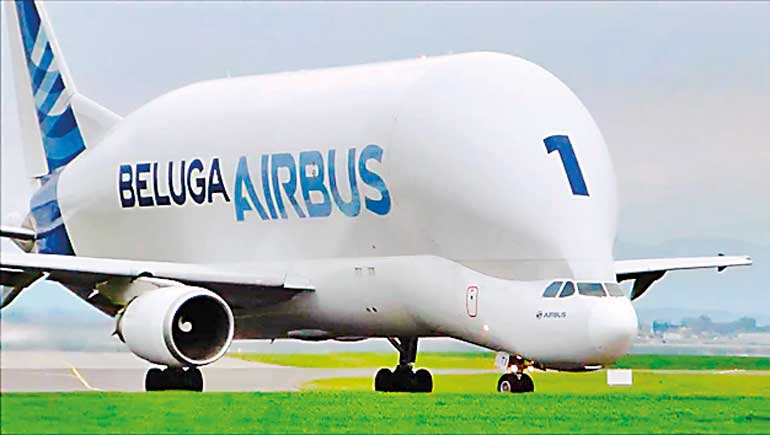Tuesday Feb 24, 2026
Tuesday Feb 24, 2026
Monday, 15 August 2016 00:01 - - {{hitsCtrl.values.hits}}

PARIS (Reuters) - Airbus Group faces potentially lengthy disruption to its business after Britain launched a criminal investigation into suspected irregularities in the use of third-party agents to win commercial jet sales.
Europe’s largest aerospace company said late on Sunday it had been notified that the UK’s Serious Fraud Office had opened a formal probe after being alerted by the country’s export credit agency to discrepancies relating to the disclosure of the work of local agents.
The probe raises a sensitive issue for the industry because the agency, UK Export Finance, has for years locked horns with aerospace firms about the need for more transparency, even though it does not object outright to the use of intermediaries.
Airbus Group said the SFO was looking into possible “fraud, bribery and corruption” and that the company continued to co-operate with the investigating agency, having itself tipped off UKEF about internal findings under a recent compliance drive.
“It will take years,” a person familiar with the matter said of the SFO investigation, adding it was too early to predict any outcome or consequences for the company or the industry.
Airbus virtually eliminated the gap with U.S. rival Boeing in their intense battle for airliner orders in July after booking about half of the 197 firm sales unveiled at the Farnborough Airshow.
Airbus Group is already the subject of a four-year-old SFO investigation into a $3.3 billion communications deal with Saudi Arabia, while the SFO is conducting a corruption probe into engine maker Rolls-Royce which it launched in 2013.
The latest case involves discrepancies over the amount of agents’ fees disclosed in applications for export support, or missing names of third parties, in some cases dating back years, people familiar with the matter have told Reuters.
In April, UKEF halted export funding over the reported discrepancies and was swiftly followed by France and Germany.
Under rules dating back to July 2006, companies applying for export support in Britain must identify any intermediaries involved in sales negotiations and list the sums paid.
The rules followed a series of policy U-turns and a fierce debate between UKEF and aerospace companies including Airbus, which had lobbied against the tougher disclosure rules on the grounds that such data was commercially sensitive and that their own codes of conduct and due diligence methods were sufficient.
The longer-term impact may depend on how widely the investigation spreads and the level of managers who signed off on payments that can be worth millions of dollars, as well as the declarations to export agencies about them, analysts said.
A spokesman declined to comment on any details of the investigation beyond Sunday’s brief statement.
Airbus is already trying to restore export funding from UKEF under a revised compliance scheme.
The company said last month it had agreed a process for this and expected export credits to resume in the fourth quarter.
But several people familiar with the case say it has deeply soured relations between Airbus and export agencies, notably UKEF, and that much work remains to be done to restore trust.
As for the operational impact of the funding hiatus, analysts say this is limited for now because liquid markets mean there is little demand for export credit. Just 5 percent of Airbus deliveries were supported by export credits last year.
One person familiar with the case told Reuters the onus was on Airbus to prove it had a robust system for preventing abuse.
One move being floated to win back confidence is a voluntary ban within Airbus on the use of percentage commissions to third-party sales agents and more careful vetting of any other form of payment, people familiar with the matter said.
The move is designed to allay concerns that payments in countries where it is common to have local representatives, which include parts of Asia and the Middle East, could be seen as a potential vehicle for bribery.
But it could provide a headache for a company which has stated to UK authorities in the past that it relies on a long-established network of representatives to remain competitive, and the ban does not appear to have unanimous support.
It could also reopen former divisions between Airbus and its parent group, whose chief executive Tom Enders launched the new tough compliance drive under a new legal head.
Currently, the playing field with Boeing is level as the corresponding system in the United States is also frozen due to political deadlock which has left the U.S. Export Import (EXIM) Bank without a fully functioning board.
But with some U.S. officials predicting EXIM could resume funding for Boeing exports around the turn of the year, Airbus could be disadvantaged in some emerging markets unless it achieves its target of reopening European credits by year-end.
In the meantime both Airbus and Boeing are having to offer the least creditworthy airlines some bridge financing.
“Financial markets have priced in aircraft financing at attractive rates so EXIM and European credit agencies haven’t had to step in. But I think this is going to become an issue,” an aviation sector analyst said, asking not to be identified.